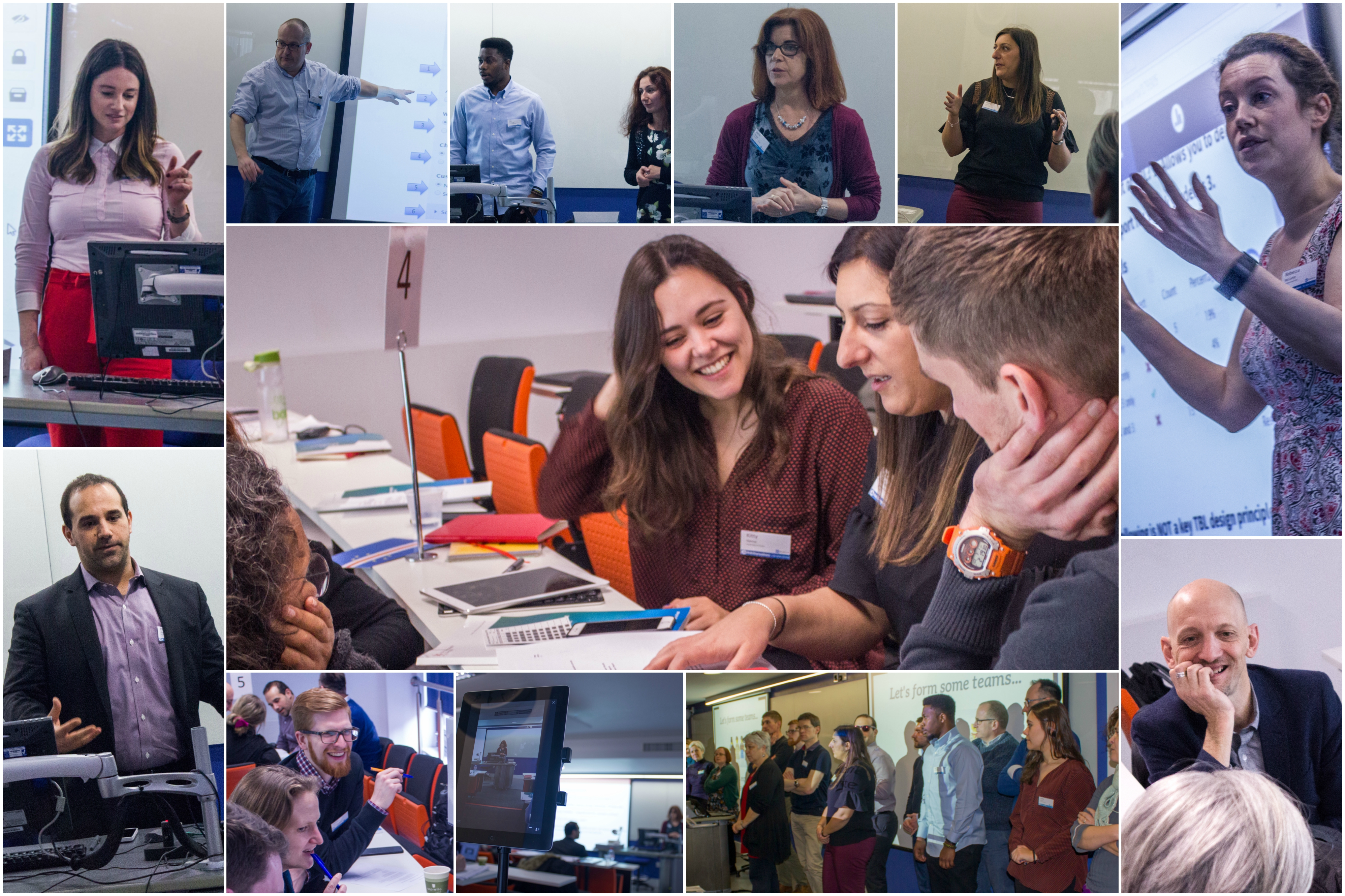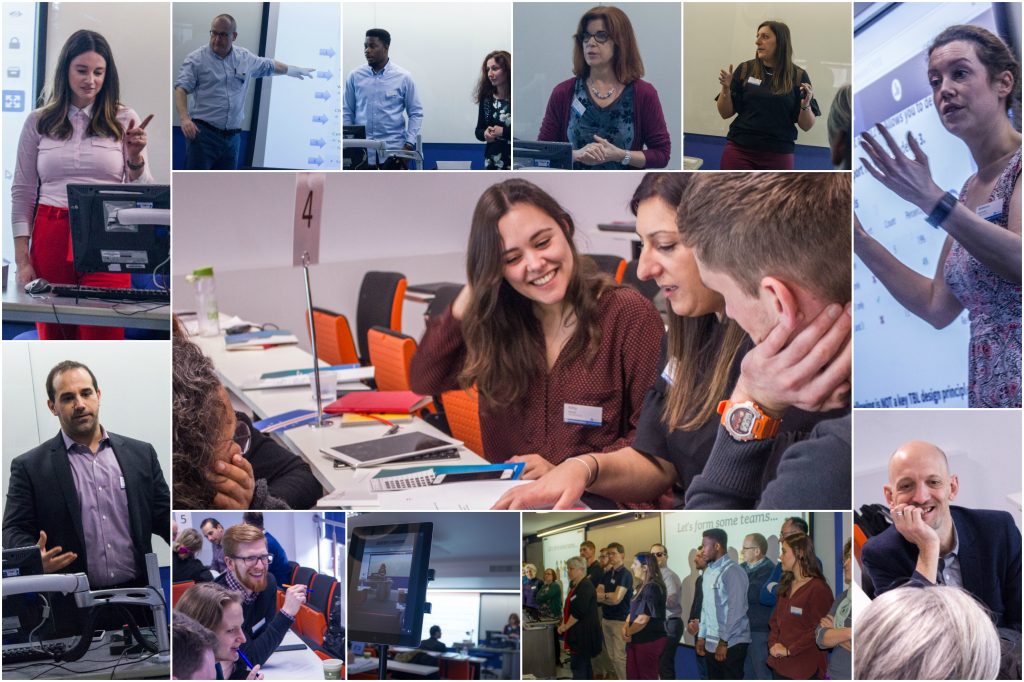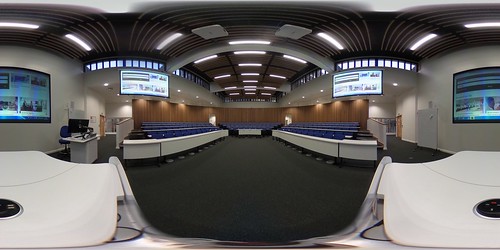Last month, City, University of London hosted the Poll Everywhere UK User Group. The community event attracted 50 participants from more than 20 UK Higher Education institutions. This was an opportunity to showcase recent developments at the University, like the newly opened entrance and our growing number of enhanced learning spaces, while sharing innovations in technology-enhanced teaching. Poll Everywhere is City’s ‘student response system’, which allows students to actively participate in lessons using their own computer or mobile device.
The event was organised by Matt Lingard and Anna Armstrong (University of West London), with support from Darren Gash (University of Surrey) and the Learning Spaces team from Learning Enhancement and Development (LEaD). Poll Everywhere sponsored the event, with Paul Giovacchini and Kelly Arbuckle joining us from their San Francisco office to share the product roadmap and collect feedback from the group.
Loving the @polleverywhere user group event with @CityUniLEaD, @mattlingard & more today. Follow #pollevuk 2 join the stream, watch talks… pic.twitter.com/dYgKLbkdDj
— Dom Pates (@dompates) March 1, 2017
The day was full of presentations, hands-on activities, sharing innovative educational practice, and discussing the impact technology can have on student learning. If you would like to watch the presentations, you can find links to the morning and afternoon sessions below. Timestamps are listed beside each speaker’s name to help you quickly navigate each presentation.
Contents
- Morning Sessions: View recording
- Using think-pair-share and Poll Everywhere to enhance engagement during lectures Alfred Thumser – University of Surrey (Recording 00:00 | PDF Presentation)
- Tips on using Poll Everywhere to enhance student learning in Radiography Jayne Morgan – City, University of London (Recording 00:18 | PDF Presentation)
- Five years of Poll Everywhere: The impact on staff and students Ade Bamigbade & Yanna Nedelcheva – University of Westminster (Recording 00:41) | PDF Presentation)
- Supporting students in revision sessions Yanna Nedelcheva & Maria Ashioti – University of Westminster (Recording 01:03 | PDF Presentation)
- 2016 in Review, 2017 Q1, and Beyond Paul Giovacchini & Kelly Arbuckle – Poll Everywhere (Recording 01:26 | PDF Presentation)
- Afternoon Sessions: View recording
- Team Based Learning Workshop Rebecca McCarter – University of Bradford (Recording 00:00 | Prezi Presentation)
- Clickable image competition Darren Gash – University of Surry (Recording 00:40)
- Developments in Learning Spaces at City Sheila Egan & Dominic Pates – City, University of London (Recording 00:54)
- How to get involved
Morning Sessions: View recording
Alfred shared his strategies for student engagement during his bioscience lectures. He recommended using ‘think-pair-share’ activities to get students talking, and to review ideas with the whole class. When allowing students to send text to the projection screen during class, there is a risk of inappropriate content being posted anonymously. Rather than letting a few bad apples spoil the bunch, Alfred highlighted features that can keep the instructor in control. Poll Everywhere has an optional ‘automatic profanity filter’ that will try to block certain words and phrases before they are displayed to the class. You can also use the ‘instructor moderation’ tool, which allows you to review and approve which comments are shared on screen.
Thinking about professionalism and the issues of using free text in class. To moderate or not to moderate. That is the question. #pollevuk
— Carl Sykes (@Carl_Sykes_TEL) March 1, 2017
Tips on using Poll Everywhere to enhance student learning in Radiography
Jayne Morgan – City, University of London (Recording 00:18 | PDF Presentation)
Jayne works with City’s School of Health Sciences, and shared her tips for enhancing student learning with technology based topics in Radiography. Her presentation showed how Poll Everywhere can be used to help build student confidence, address knowledge gaps, and make large-group lectures more interactive. Tips included the negotiation of ground rules and expectations with students, keeping questions simple, using a variety of question types, and allowing time to correct misconceptions or review difficult topics. Jayne hopes to research Poll Everywhere’s impact on student engagement, and whether it can improve performance on assessments.
‘Don’t ask too many questions’ when using @polleverywhere, says Jayne Morgan at #pollevuk event – be smart in how you use it… pic.twitter.com/533jFGo8yl
— City Uni LEaD (@CityUniLEaD) March 1, 2017
Five years of Poll Everywhere: The impact on staff and students
Ade Bamigbade & Yanna Nedelcheva – University of Westminster (Recording 00:41) | PDF Presentation)
Supporting students in revision sessions
Yanna Nedelcheva & Maria Ashioti – University of Westminster (Recording 01:03 | PDF Presentation)
The University of Westminster has been using Poll Everywhere for five years, and shared their experience evolving the ways it’s being used across the institution. Out of all the technologies they have deployed in recent years, feedback indicated that Poll Everywhere was the easiest for users to learn and start using. Along with a suite of recommended mobile apps, Poll Everywhere helped enhance learning at Westminster, encouraging collaboration and greater connectivity in the Faculty of Science and Technology. Student feedback was collected after embedding polls in neuroscience lectures for revision. Responses indicated that students overwhelmingly liked using Poll Everywhere, and wanted to see it used more widely across their courses.
2016 in Review, 2017 Q1, and Beyond
Paul Giovacchini & Kelly Arbuckle – Poll Everywhere (Recording 01:26 | PDF Presentation)
Paul and Kelly provided an update on the latest Poll Everywhere developments, based on community feedback. Surveys, emoji responses, integration with PowerPoint, and CSV exporting were highlighted additions from 2016. More features are currently undergoing active development, and will be automatically rolled out to customers throughout 2017. They are always looking for feedback from the community, and you can send your own comments to Poll Everywhere directly using this this link.
Afternoon Sessions: View recording
Team Based Learning Workshop
Rebecca McCarter – University of Bradford (Recording 00:00 | Prezi Presentation)
Leading an afternoon of professional development can be challenging – thoughts start to drift towards neglected emails, and participants might start feeling sluggish from that extra piece of cake at lunch. Fortunately, this was not a problem, with the afternoon focused on active participation and engagement. Rebecca McCarter welcomed us back with an introduction to Team Based Learning (TBL), using an activity based on the principles of TBL. She demonstrated how Poll Everywhere can be used to support this pedagogical approach, and track student engagement. There is a growing interest in ‘flipped learning’ across high education, and its potential impact on the face-to-face instruction time with students. TBL is a detailed framework to help incorporate active learning into the instructional design of a module, encouraging student accountability through independent learning and in-class participation.
TBL is designed to be integrated throughout a module. Using small teams, students are encouraged to engage in problem-solving, discussion, and feedback with class sizes from 20 to 200. The framework includes a process called ‘readiness assurance’ followed by in-class activities for applying knowledge or solving problems. Rebecca demonstrated how Poll Everywhere can be used throughout the session to track individual and team results, and how to adjust teaching based on student needs.
Five-Stage Readiness Assurance
- Preparatory materials: This can be readings, notes, videos, or links. To be completed by students individually before each class.
- Individual Readiness Assurance Test (iRAT): Short multiple choice quiz at the beginning of each session with questions related to the preparatory materials. This can be administered using Poll Everywhere, tracking individual results and encouraging accountability for completing personal study outside of class.
- Team Readiness Assurance Test (tRAT): This is the same quiz and questions as before, but this time students work in their teams to agree on the answers. Scratch cards can be used to help students work towards the correct answer. Teams negotiate which answer to submit, with each incorrect guess recorded throughout the process.
- Appeals: Teams have the opportunity to write an appeal, defending an alternative answer. They work together to write an argument for their position, and must cite evidence from the provided materials.
- Mini-Lecture: With individual and team data collected using Poll Everywhere, the readiness assurance process is followed by a mini lecture to review problematic concepts or misunderstandings.
Application Activity (4S Framework)
Much of the remaining class time is dedicated to applying knowledge using the ‘4S Problem-Solving Framework’. The instructor introduces a Significant problem, and each of the teams work on the Same problem. Groups are provided with a limited number of options to choose from, and must decide on a Specific choice, with all groups Simultaneously reporting back to the class. This framework ensures that the problems are relevant and capture student interest. Each group works on the same problem and has a limited number of options, helping students compare and defend their conclusions. Simultaneous reporting is intended to help groups rationalise their thinking, challenge other teams, and defend their work.
Students are actively evolved in each stage of the TBL process, and are challenged to think deeply about course material. It encourages in-class interactions, and provides opportunities for the instructor to respond to the class with real-time feedback. This session was an excellent example of technology, in this case Poll Everywhere, used to enhance pedagogical practices in higher education.
If you would like to learn more about Team Based Learning, the University of British Columbia has published an Introduction to TBL, along with a PDF Instructor Guide.
Clickable image competition
Darren Gash – University of Surry (Recording 00:40)
Darren helped keep the afternoon lively with a poll design competition. Using the advanced features of Poll Everywhere, our groups were challenged with creating a penguin-themed ‘clickable image’ poll. This question type allows you to present a photo or graphic for students to click, showing which regions of the image were selected. Groups were asked to vote on the most creative poll, and the winning team took home a tasty pack Penguin biscuits.
Some clickable image fun #spottheball @polleverywhere #pollevUK #altc with Darren Gash pic.twitter.com/8hJpGSDnDy
— City Uni LEaD (@CityUniLEaD) March 1, 2017
Developments in Learning Spaces at City
Sheila Egan & Dominic Pates – City, University of London (Recording 00:54)
Sheila and Dom, from the Educational Technology Team, closed the event with an overview and tour of City’s learning spaces. After a full day discussing technology, and pedagogy to support active learning, we were proud to highlight the development of our own spaces for facilitating innovative teaching. The tour led participants through the Drysdale basement, which features spaces with movable furniture, node chairs, swivel seats, group working spaces, and our new DALI teaching podiums. We concluded in room B200, City’s latest lecture theatre, which you can explore using the 360 image below.
How to get involved
If you would like to try using Poll Everywhere at City, you can request an account via ServiceNow. Contact your school’s Educational Technologists if you would like to have a discussion about using Poll Everywhere or flexible learning spaces in your teaching. To learn more about using Poll Everywhere, visit their video support page, or take a look at our detailed guidance.
If you are interested in joining the Poll Everywhere User Group, visit their website or subscribe to the JISCMail list, which will have updates about the next community event.





